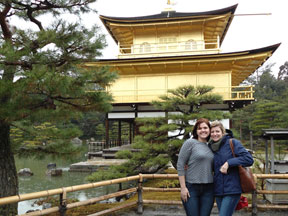Microbiology professors Allan Zajac, Ph.D., and Scott Barnum, Ph.D., are consistently amazed by the drive of their Graduate Biomedical Sciences students. They say Maureen Cox and Theresa Ramos are the latest examples of the heights students can reach with effort and dogged determination.
 |
| Maureen Cox (left) and Theresa Ramos are two of 53 students who were selected from around the world to attend the first Winter School on Advanced Immunology in Hyogo, Japan. |
Cox and Ramos were among 53 participants selected worldwide to participate in the first Winter School on Advanced Immunology in January on Awaji Island in Hyogo, Japan. The program was directed jointly by the Immunology Frontier Research Center at Osaka University (IFReC) and the Singapore Immunology Network (SIgN) and was created to provide a new education and networking venue for young researchers.
Cox and Ramos were selected from several hundred applicants in 48 countries, making UAB the only school other than the host institutions with multiple students selected to attend.
“It was a once-in-a-lifetime experience,” says Ramos, a South Carolina native and a fourth-year graduate student in Barnum’s lab. “The lecturers and students there are considered some of the best of the world. To have that opportunity in a small setting, to have discussions with them as we did, was so valuable.”
The students endured a rigorous screening process to be selected, and they had to present a poster and an eight-minute talk on their research. Zajac says their selection illustrates the value of hard work and demonstrates that UAB students have an opportunity for their science research to be heard and seen worldwide.
“There is world-quality science at UAB and worldwide opportunity for our students,” Zajac says. “They have the ability to compete internationally here, and that’s what science is today. The work is not just done in Alabama or the United States; you have to be able to compete with labs around the world. Our students can do this, and they had the opportunity to showcase that.”
Cox is a sixth-year doctoral student from San Diego whose primary research focuses on host defense against infections. Specifically, Cox is looking at T-cell response to viral infection.
She says the guidance and freedom Zajac has provided has enabled her to flourish in her work. “I’ve been able to develop and pursue things I’m interested in,” Cox says. “I’ve kind of been given free rein, which has been really great. Eventually, I’d like to have my own lab, and I’m going to have to develop my own research program. This experience at UAB has been invaluable to me.”
Ramos’ research has focused on the complement system — a part of the immune system — and its response to malaria, particularly cerebral malaria, which kills close to 1 million children a year in sub-Saharan Africa. The disease, which largely remains misunderstood, has no effective treatment.
Barnum, Ramos’ mentor, says she developed a model system to investigate the disease virtually on her own.
“No one at UAB was using that system when she came to us,” Barnum says. “Theresa was taught that model by a former student in about four days, and she’s been playing with it for more than two years now. She’s just done a fantastic job developing and running that system.”
An important aspect of the students’ trip to Japan is the opportunity to meet other scientists. Cox was especially excited to meet Shimon Sakaguchi, one of her scientific heroes. Sakaguchi rediscovered regulatory T-cells, which are important to prevent autoimmunity.
They also had the opportunity to meet and talk with researchers at their level of development, and in the future those connections also may prove fruitful.
“They met a huge number of people from all around the world who are doing top-notch immunology research,” Barnum says. “You never know where those interactions are going to lead. It could be a post-doc position, a collaboration or something else in five years.”
Ramos says she and Cox have Zajac and Barnum to thank for these opportunities.
“Our mentors and our PIs gave us viable projects and pushed and led us to what’s interesting within our projects,” Ramos says. “Without their guidance, we wouldn’t have gotten as far as we did.”
About GBS
Cox and Ramos are part of the GBS community at UAB, which comprises 440 students and 350 faculty. Students participate in multiple interdisciplinary thematic programs that integrate more than 25 departments and 20 research centers in the School of Medicine, partner schools throughout the university, Southern Research and HudsonAlpha, an affiliated drug-discovery and biotechnology institute.
UAB consistently is ranked among the top 25 institutions for National Institutes of Health research funding and provides its graduate students the flexibility, guidance, resources and training to become highly competitive for outstanding postdoctoral and professional positions.
UAB offers interdisciplinary training pathways in GBS in addition to immunology:
- Biochemistry and structural biology
- Cancer biology
- Cell, molecular and developmental biology
- Genetics and genomic sciences
- Microbiology
- Neuroscience
- Pathology and molecular medicine
For more information, visit www.uab.edu/gbs.
